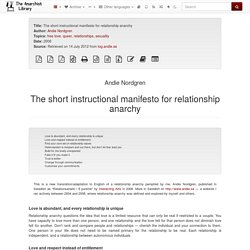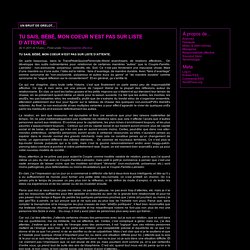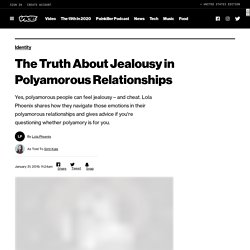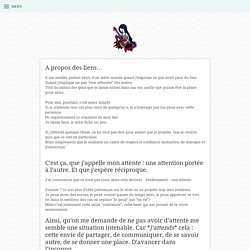

8 Things to Consider in Polyamorous Dating Before Committing to Another Partner. There is a lot of media representation of people entering new relationships.

Popular movies, series, literature, and music all represent the processes that come with starting to date a new partner – navigating the shyness, the confusion, the excitement, the infatuation, and all the other feelings that come with entering new (heteronormative) relationships. And by heteronormative relationships, I mean relationships which are heterosexual, monogamous, and otherwise conform to society’s idea of what a “normal” relationship is like. These relationships are well-represented in the media, but when it comes to non-monogamous relationships, we’re kinda out of our depth. I came to terms with my polyamory when I was dating someone I loved deeply. I met another wonderful person, realized I liked them too, and I found myself being deeply attracted to two people at once. This is because I had never seen relationships like mine represented in the media. It was a confusing time. 1. 2. 3. 4. So You Want to Try Polyamory. Source: Showtime So you’ve been reading about polyamory and have decided it’s something you want to try.

Or maybe you’re still thinking about it, but don’t have a clear sense of where you’d even begin. Here are a few tips, guidelines, and things to consider for people just starting out in the polyamorous world. Questions to Ask Yourself Partly because it’s outside of our cultural norm, and partly because it involves coordinating the needs and preferences of so many people, being happily polyamorous pretty much requires the ability to reflect on what you want and communicate it with your partners. Whether you’re starting out solo or opening up an existing relationship, these are some questions that will be very helpful to ponder at the beginning of your polyam journey. 1. What great things are you expecting polyamory to bring to your life? If you’re opening up an existing relationship, it’s good for you to know what your partner is hoping to gain and vice versa. 2. 3.
More Than Two: A Practical Guide to Ethical Polyamory by Franklin Veaux. Opening Up: A Guide to Creating and Sustaining Open Relationships by Tristan Taormino. Trauma Informed Polyamory (Workshop) Love Without Emergency (Zine) Le petit manuel d'éducation à l'anarchie relationnelle. The short instructional manifesto for relationship anarchy. This is a new translation/adaptation to English of a relationship anarchy pamphlet by me, Andie Nordgren, published in Swedish as “Relationsanarki i 8 punkter” by Interacting Arts in 2006.

More in Swedish on — a website I ran actively between 2004 and 2008, where relationship anarchy was defined and explored by myself and others. Love is abundant, and every relationship is unique Relationship anarchy questions the idea that love is a limited resource that can only be real if restricted to a couple. You have capacity to love more than one person, and one relationship and the love felt for that person does not diminish love felt for another. Don’t rank and compare people and relationships — cherish the individual and your connection to them. Love and respect instead of entitlement. Un bruit de grelot… » Responsabilité affective. On parle beaucoup, dans le TransPédéGouineFéministe-World anarchisant, de relations affectives… On développe des outils rudimentaires pour relationner de certaines manières “autres” que le Couple-Famille-Labrador : non-exclusivité, polyamour, collectifs, etc.

Soit. Ce n’est pas forcément une mauvaise chose. Mais d’une manière ou d’une autre, l’idée est la même : faire d’avantage, de manière durable. Avec “faire d’avantage” comme synonyme de “non-exclusivité, polyamour et autres trucs du genre” et “de manière durable” comme synonyme de “vague réflexion sur le consentement”. Et en général, ça s’arrête là. Ce qui me chagrine, dans toute cette histoire, c’est que finalement on parle assez peu de responsabilité affective. La relation, en tant que ressource, est épuisable et finie (ne serait-ce que pour des raisons matérielles de temps). 15 Comments Polyamorous People Are Tired of Getting. Polyamorous Relationships: How to Deal With Jealousy. Illustration by Camilla Ru My First Time is a column and podcast series exploring sexuality, gender, and kink with the wide-eyed curiosity of a virgin.

We all know your "first time" is about a lot more than just popping your cherry. From experimenting with kink to just trying something new and wild, everyone experiences thousands of first times in the bedroom—that's how sex stays fun, right? This week, we're talking to Non-Monogamy Help podcaster and advice columnist Lola Phoenix about their experiences of polyamory. I want to explore polyamory but I live in a small community. What happens if word gets out? “Ask Kai: Advice for the Apocalypse” is a column by Kai Cheng Thom to help you survive and thrive in a challenging world.

Have a question for Kai? Email askkai@dailyxtra.com. Some red-flags part 1. Some red-flags part 2. Toxic monogamy. Erreurs courantes en polyamour - Polyamour.info. Ne pas voir le verre à moitié vide, mais ne pas non plus le voir à moitié plein...

Une liste des erreurs courantes commises dans les relations polyamoureuses, traduite de l'anglais. Avec toute ma reconnaissance envers Suzie, pour sa perspicacité et ses contributions. On peut trouver un excellent guide pour foirer ses relations polyamoureuses sur le site du forum alt.polyamory. Il décrit dans le détail toutes les choses mesquines, sordides et malveillantes qu'on peut faire pour être sûr de ruiner sa relation de la façon la plus dramatique et douloureuse possible. Ce n'est pas de cette page qu'il s'agit. A propos des liens... - A propos des liens… Il me semble parfois venir d'un autre monde quand j’exprime ne pas avoir peur du lien.

Quand j'explique ne pas “rien attendre” des autres.Tout du moins des gens que je laisse entrer dans ma vie, quelle que puisse être la place prise alors. Pour moi, pourtant, c'est assez simple : Si je n’attends rien (ou plus rien) de quelqu’un.e, je n’interagis pas (ou plus) avec cette personne. Ni régulièrement ni vraiment de mon fait.